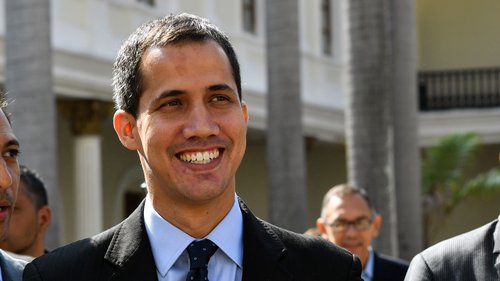MADRID/PARIS, (Reuters) – Nine European nations joined the United States in recognising opposition leader Juan Guaido as Venezuela’s interim president today, heightening a global showdown over Nicolas Maduro’s socialist rule.
France, Spain, Germany, Britain, Portugal, Sweden, Denmark, Austria and the Netherlands’ coordinated move came after the expiry of an eight-day ultimatum for Maduro to call a new election.
The Venezuelan leader, accused of running the OPEC nation of 30 million people like a dictatorship and wrecking its economy, has defied them and said European rulers are sycophantically following President Donald Trump.
Guaido, who leads the National Assembly, declared himself caretaker leader last month in a move splitting international powers and bringing Venezuelans onto the streets.
Trump immediately recognised him but European Union nations were nervous over the global precedent.

Russia and China, who have poured billions of dollars of investment and loans into Venezuela, are supporting Maduro in an extension of their geopolitical tussle with the United States.
“From today, we will spare no effort in helping all Venezuelans achieve freedom, prosperity and harmony,” Spanish Prime Minister Pedro Sanchez said, urging both fair elections and humanitarian aid.
British Foreign Secretary Jeremy Hunt said Venezuelans had suffered enough. “The oppression of the illegitimate, kleptocratic Maduro regime must end,” he said.
Maduro, 56, a former union leader, bus driver and foreign minister, replaced ex-president Hugo Chavez in 2013 after his death from cancer. But he has presided over an economic collapse and exodus of 3 million Venezuelans.
He blames Washington for an “economic war” and coup pretensions aimed at controlling oil. Venezuela has the largest reserves in the world, but production has plunged under Maduro.
Critics say incompetent policies and corruption have impoverished a once-wealthy nation while dissent has been brutally crushed.
Russia accused European nations of foreign meddling.
“We think that imposing some kind of decisions or trying to legitimise an attempt to usurp power is both direct and indirect interference in Venezuela’s internal affairs,” Kremlin spokesman Dmitry Peskov told reporters.
The Maduro government is paying both Russian and Chinese loans with oil.
He won re-election last year, but critics say it was a sham. Two opposition rivals with a good chance of winning were barred from standing, while food handouts and other subsidies to hungry Venezuelans were linked with political support.
Italy’s 5-Star Movement, which makes up half of the ruling coalition, dissented from the European stance, saying it would never recognise self-appointed leaders.
“Handing out ultimatums, sanctions, freezing Venezuelan goods … It would mean opening the road to a military intervention,” Alessandro Di Battista, a prominent 5-Star figure, said on Sunday.
But its governing partner, the League, has backed Guaido.
“I’m with the Venezuelan people against regimes like that of Maduro, based on violence, fear and hunger,” League leader, Matteo Salvini, said last month.
In an interview with Corriere Della Sera newspaper on Monday, Guaido said he “will do whatever it takes” to persuade Italy to join the position of other EU nations.
In addition to the European pressure, a bloc of Latin American nations plus Canada were to meet on Monday seeking to maintain pressure on Maduro.
